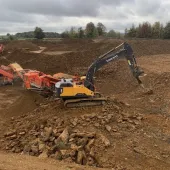MPA urges renewed Government commitment to minerals supply
Government-funded AM2023 report triggers call for action on falling aggregate reserves
A NEW report for the Government showing declining reserves of aggregates over two decades has prompted fresh calls for urgent action if Britain’s ambition to build 1.5 million homes and futureproofed infrastructure is to be realized.
Published last week, the Aggregates Minerals Survey 2023 (AM2023) is the latest four-yearly study, prepared by the British Geological Survey (BGS) for the Ministry of Housing, Communities & Local Government (MHCLG), that assesses the national supply and demand of aggregate to inform future mineral planning policy.
AM2023 shows that permitted aggregate reserves in Great Britain fell by some 46% between 2001 and 2023, a worrying downward trend according to Britain’s aggregate producers, represented by the Mineral Products Association (MPA).
According to the MPA, the proposed changes to the planning system that are meant to speed up new housing approvals will do little to halt the decline in permitted reserves of the materials needed to build them – for foundations, floors, walls, rooftiles, driveways, associated services, and amenities.
Aggregates continue to represent the largest material flow in the British economy, comprising the vast majority of material for all construction products and being the only bulk material to be sourced almost entirely domestically.
The MPA has called on the Government to renew its commitment to the long-established Managed Aggregate Supply System (MASS) that is intended to ensure a steady and adequate supply of aggregates for construction and industry. Yet despite years of warnings from the minerals industry to the contrary, consecutive governments continue to take aggregate supply for granted whilst reserves continue to dwindle.
Mark Russell, executive director for planning and mineral resources at the MPA, said: ‘Aggregate Minerals surveys are a vital part of the Managed Aggregate Supply System. Failure to respond to the findings of AM2023 would create a serious and costly risk not just to the minerals sector, but also to the construction industry and the wider national economy, especially given that up to half of all aggregates are procured, directly and indirectly, by the Government.
‘As it stands, areas such as the south-east of England rely heavily on imports of materials from other regions in the country. The long-term planning for these supplies, and the transport and infrastructure needed to deliver them, is vital to economic development.
‘Britain is blessed with a diverse geology and while we understand the Government’s focus on ‘critical’ minerals over recent years, it has undoubtedly taken its finger off the pulse regarding the bread-and-butter minerals that the economy, and particularly the construction sector, relies upon. We hope the Government will heed the message from the AM2023 report, that the decline in permitted reserves must be urgently addressed to support investment in UK plc.’
The MPA has repeatedly highlighted that government policy, particularly around the delivery of housing and infrastructure, assumes that mineral products such as aggregates (and downstream products such as concrete and asphalt) are in plentiful supply. However, the reality remains that while Britain has an abundance of mineral resources in the ground, securing the permitted reserves to meet the country’s demands requires long-term planning, monitoring, and continual management – a principle which successive governments have failed to deliver upon.
For example, National and Sub-National Guidelines on Future Aggregate Provision, providing essential national and regional forecasts of need, have not been renewed since 2009, with the latest guidelines having expired in 2020. On the back of the Planning and Infrastructure Bill, the MPA is urging the Government to provide more support and stronger planning policy for the mineral planning system as it anticipates a refresh of the National Planning Policy Framework towards the end of the year. A further risk to supplies is that most current planning permissions expire in February 2042. Both issues can and must be fixed but successive governments have failed to act, says the MPA.
The BGS report shows that total permitted reserves of aggregate in Great Britain (including sites worked in the past but still containing reserves and sites that have yet to be opened) at the end of 2023 were 5,106 million tonnes. Crushed rock accounted for 90% (4,589 million tonnes) and sand and gravel the remaining 10% (518 million tonnes).
Total permitted reserves in Great Britain have decreased by 359 million tonnes (7%) since 2019. In England and Wales, total permitted reserves show a 10% decrease of 396 million tonnes since the previous report (2019) when total reserves for aggregate use were 4,157 million tonnes, comprising 3,697 million tonnes of crushed rock and 460 million tonnes of sand and gravel.
The Aggregate Minerals survey is the only nationally co-ordinated data-collection exercise of its kind and is only carried out every four or five years. Since the cessation of the Annual Minerals Raised Inquiry survey, which the MPA says was a short-sighted cost-saving exercise by government in 2014, central and local government planners must now rely upon on this ‘spot’ data and infer information between surveys. The MPA says this decision significantly increased the risk of inaccurate assumptions being made around the condition and sustainability of the reserve base for construction aggregates, potentially culminating in a shortfall of construction materials.










